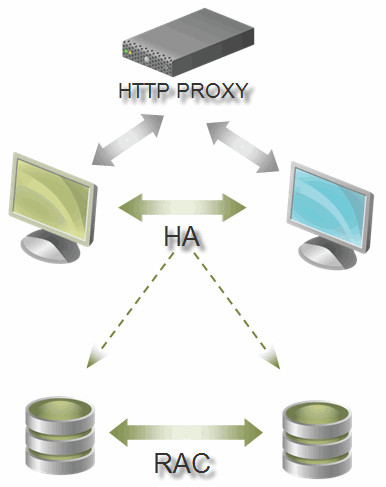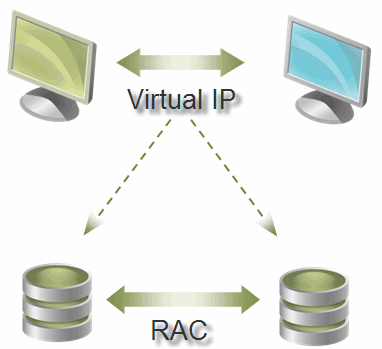Running on Oracle RAC
In this configuration, the Management Server was installed on two distinct physical hosts, one acting as HA mode primary, and the other as secondary. This setup was run over an Oracle® RAC cluster to provide HA at the database layer. In addition, an HTTP proxy was configured to provide end users with a single URL for access to the Foglight™ browser interface.
|
2 |
Choose the Configure Later option. |
|
4 |
|
6 |
Replace the datasource-oracle.properites file on each machine with the modified one shown partially in Step 4. |
|
NOTE: The previous procedure outlines only one method of configuration. Other methods include: using the SQL scripts included with Foglight to do the first-time configuration, and further configuration of the oracle-ds.xml file. These methods are possible, but have not been tested. |
Running behind an HTTP proxy
In the following example, a third-party software program called balance is used as a proxy.
|
1 |
|
2 |
Configure balance to forward connections made to the server’s port 8888 to the Foglight™ UI port on the two machines in the HA cluster. |
Running in a cluster
This section describes one scenario for running the Foglight™ Management Server in HA mode with clustering at the application layer. In particular, the focus is on operating system level clustering used in commercial systems such as Oracle®, Microsoft®, and VeritasTM clusters.
This scenario uses the Linux® HA Project’s heartbeat software for SuSE ES 10.1. The heartbeat package includes a virtual IP resource called IPaddr2.
For more information about the Linux HA Project and heartbeat, see http://linux-ha.org.
Tuning connection issues in HA implementations
These issues may be attributable to JGroup (the underlying communication package that JBoss® uses for its HA implementation) and to the fact that a Foglight HA implementation uses UDP for communication by default and UDP is by nature an unreliable protocol.


